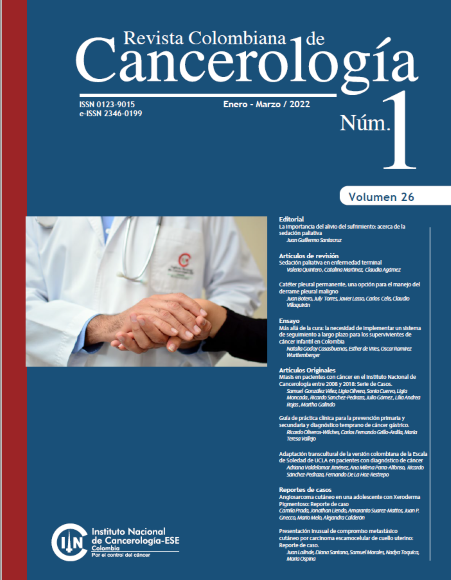Transcultural adaptation of the Colombian version of the UCLA Loneliness Scale in patients diagnosed with cancer
DOI:
https://doi.org/10.35509/01239015.764Keywords:
loneliness, Surveys, Questionnaires, neoplasmAbstract
Introduction: Considering that unwanted loneliness is a construct that have shown a negative impact on different aspects of health and that is probably related with negative outcomes in patients having cancer, it is important to have instruments like the UCLA loneliness scale, version 03, to evaluate the importance of this construct in such type of patients.
Objective: To translate and perform transcultural adaptation of the UCLA loneliness scale, version 03 for its use in patients having cancer in Colombia.
Methods: The process of translation and transcultural adaptation followed the methodology proposed by the EORTC group, aimed at achieving semantic equivalence with the original version of the scale. A pilot test has been made with 20 Colombian patients diagnosed with different types of cancer, attending the Instituto Nacional de Cancerología E.S.E.
Results: In the reconciliated version, item UC1 has been modified. There has been not changes neither in translation of instructions, nor in response options. In pilot testing two out of 20 patients reported that items UC6, UC7, UC11 y UC19 should be modified and one patient mentioned that item UC8 was difficult to understand; however, no changes were made taking into account the low number of patients describing similar findings, and because these suggestions could change the semantic equivalence of these items. No items were deemed offensive.
Conclusion: It is available a transculturally adapted version of the UCLA loneliness scale, version 03 for its validation in patients with cancer in Colombia.
Author Biographies
adriana Valdelamar Jiménez, Grupo Área Investigación Clínica, Instituto Nacional de Cancerología, Bogotá, Colombia
Doctorado en Salud Pública; Facultad de medicina; Universidad Nacional de Colombia.
Ana Milena Parra-Alfonso, Grupo Área Investigación Clínica, Instituto Nacional de Cancerología, Bogotá, Colombia
Filiación:
Grupo área investigación clínica; Instituto Nacional de Cancerología E.S.E.
Maestría en Epidemiología Clínica; Facultad de medicina; Universidad Nacional de Colombia.
Ricardo Sánchez-Pedraza, Grupo Área Investigación Clínica, Instituto Nacional de Cancerología, Bogotá, Colombia
Facultad de Medicina, Universidad Nacional de Colombia, Bogotá, Colombia
Fernando De La Hoz-Restrepo, Facultad de Medicina, Universidad Nacional de Colombia, Bogotá, Colombia
Departamento de Salud Pública; Facultad de medicina; Universidad Nacional de Colombia.
References
Organización Mundial de la Salud OMS. Datos y cifras sobre el cáncer 2020 [Internet]. [Citado el 11 de abril de 2021]. Disponible en: https://www.who.int/cancer/about/facts/es/.
International Agency for Research on Cancer. Cancer Tomorrow 2020 [Internet]. [Citado el 11 de abril de 2021]. Disponible en: http://gco.iarc.fr.
Instituto Nacional de Cancerología (INC). Anuario estadístico 2018 [Internet]. [Citado el 11 de abril de 2021]. Disponible en: https://www.cancer.gov.co/files/libros/archivos/Anuario%20INC%202018.pdf.
Deckx L, van den Akker M, Buntinx F. Risk factors for loneliness in patients with cancer: A systematic literature review and meta-analysis. Eur J Oncol Nurs. 2014;18(5):466-77. https://doi.org/10.1016/j.ejon.2014.05.002
Cigdem O, Zeynep O. Cancer patients and loneliness: A systematic review. Nursing Practice Today. 2016;3(4): 128-39.
Stanton AL. What happens now? Psychosocial care for cancer survivors after medical treatment completion. JClin Oncol. 2012;30(11):1215-20. https://doi.org/10.1200/JCO.2011.39.7406
Peplau L GS. Preventing the harmful consequences of severe and persistent loneliness. Peplau LA, Goldston SE, editors. Rockville, MD, US: National Institute of Mental Health; 1984.xi, 131-xi, p.
Peplau LA PD. Perspectives on loneliness. Wiley: New York:In loneliness: A sourcebook of current Theory, Research and practice; 1982.
D’ippolito S, Ambrosini E, Shams M, Calì G, Pastorelli D. The effect of loneliness on cancer mortality. J Clin Oncol. 2017;35(15_suppl):10070.
Cacioppo S, Grippo AJ, London S, Goossens L, Cacioppo JT. Loneliness: clinical import and interventions. Perspect Psychol Sci. 2015;10(2):238-49. https://doi.org/10.1177/1745691615570616
Nausheen B, Carr NJ, Peveler RC, Moss-Morris R, Verrill C, Robbins E, et al. Relationship between loneliness and proangiogenic cytokines in newly diagnosed tumors of colon and rectum. Psychosom Med. 2010;72(9):912-6. https://doi.org/10.1097/PSY.0b013e3181f0bc1c
Wells M, Kelly D. The loneliness of cancer. Eur J Oncology Nursing. 2008;12(5):410-1. https://doi.org/10.1016/j.ejon.2008.11.003.
Cacioppo JT, Hawkley LC, Thisted RA. Perceived social isolation makes me sad: 5-year cross-lagged analyses of loneliness and depressive symptomatology in the Chicago Health, Aging, and Social Relations Study. Psychol Aging. 2010;25(2):453-63. https://doi.org/10.1037/a0017216
Hensley B, Martin P, Margrett J, Macdonald M, Siegler I, Poon L, et al. Life Events and Personality Predicting Loneliness Among Centenarians: Findings From the Georgia Centenarian Study. J Psychol. 2012;146:173-88. https://doi.org/10.1080/00223980.2011.613874
Kingsley C, Patel S. Patient-reported outcome measures and patient-reported experience measures. BJA Education. 2017;17(4):137-44.
Muñiz J, Hambleton R. Adaptación de los tests de unas culturas a otras. Metodología de las Ciencias del Comportamiento. 2000;2:129-49.
Lira MT, Caballero E. Adaptación transcultural de instrumentos de evaluación en salud: historia y reflexiones del por qué, cómo y cuándo. Rev Méd Clínica Las Condes. 2020;31(1):85-94.
Liang-Fu You J-RY, Mu-Chun Su. Expression Profiles of Loneliness-associated Genes for Survival Prediction in Cancer Patients. Asian Pac J Cancer Prev. 2014;15(1):185-90. https://doi.org/10.7314/apjcp.2014.15.1.185
De Jong-Gierveld J. Developing and testing a model of loneliness. J Pers Soc Psychol. 1987;53(1):119-28. https://doi.org/10.1037//0022-3514.53.1.119
DiTommaso E, Spinner B. The development and initial validation of the Social and Emotional Loneliness Scale for Adults (SELSA). Personality and Individual Differences.1993;14(1):127-34.
Adamczyk K, DiTommaso E. Psychometric Properties of the Polish Version of the Social and Emotional Loneliness Scale for Adults (SELSA-S). Psihologijske Teme. 2014;23:327-41.
Rubio R, Rico A. La escala “Este”, un indicador objetivo de soledad en la tercera edad. Geriatrika. 1999;15:26-35.
Adams RN, Mosher CE, Rand KL, Hirsh AT, Monahan PO, Abonour R, et al. The Cancer Loneliness Scale and Cancerrelated Negative Social Expectations Scale: development and validation. Qual Life Res. 2017;26(7):1901-13. https://doi.org/10.1007/s11136-017-1518-4.
Russell D, Peplau LA, Cutrona CE. The revised UCLALoneliness Scale: Concurrent and discriminant validity evidence. J Pers Soc Psychol. 1980;39(3):472-80. https://doi.org/10.1037//0022-3514.39.3.472.
Russell DW. UCLA Loneliness Scale (Version 3): Reliability, validity, and factor structure. J Pers Assess. 1996;66(1):20-40. https://doi.org/10.1207/s15327752jpa6601_2
Elphinstone B. Identification of a Suitable Short-form of the UCLA-Loneliness Scale. Australian Psychologist. 2018;53(2):107-15.
Durak M, Senol-Durak E. Psychometric Qualities of the UCLA Loneliness Scale-Version 3 as Applied in a Turkish Culture. Educ Gerontology. 2010;36(10-11):988-1007.
Boffo M, Mannarini S, Munari C. Exploratory structure equation modeling of the UCLA loneliness scale: A contribution to the Italian adaptation. TPM. 2012;19:345-
Arimoto A, Tadaka E. Reliability and validity of Japanese versions of the UCLA loneliness scale version 3 for use among
mothers with infants and toddlers: a cross-sectional study. BMC Womens Health. 2019;19(1):105. https://doi.org/10.1186/s12905-019-0792-4
Vazquez. A JR. ULS: Escala de soledad UCLA revisada. Fiabilidad y validez de una versión española. Rev Psicología de la Salud. 1994;6(1):45-64.
Serrano R. Adaptación de la escala de soledad- Loneliness scale UCLA- en mujeres en situación de violencia del Estado de México. Toluca, México: Universidad Autónoma del Estado de México; 2018.
Zarei S, Memari AH, Moshayedi P, Shayestehfar M. Validity and reliability of the UCLA loneliness scale version 3 in Farsi. Educ Gerontology. 2016;42(1):49-57.
Anjum BI. Translation and cross language validation of UCLA loneliness scale among adults. SciIn. 2016;28(4):217-521.
Dewolf L, Koller M, Velikova G, Johnson C, Scott N, Bottomley A. EORTC Quality of Life Group Translation Procedure. 2009.
Hawkley LC, Cacioppo JT. Loneliness matters: a theoretical and empirical review of consequences and mechanisms. Ann Behav Med. 2010;40(2):218-27. https://doi.org/10.1007/s12160-010-9210-8
Drageset J, Eide GE, Dysvik E, Furnes B, Hauge S. Loneliness, loss, and social support among cognitively intact older people with cancer, living in nursing homes--a mixedmethods study. Clin Interv Aging. 2015;10:1529-36. https://doi.org/10.2147/CIA.S88404
Gaite LR, Herrera S, Vazquez Barquero, JL. Traducción y adaptación transcultural de instrumentos de evaluación en psiquiatría: aspectos metodológicos Arch Neurobiol (Madr).1997;60(9):91-111.
Sánchez R, Venegas M, Otero J, Sánchez O. Adaptación transcultural de dos escalas para medir la calidad de vida en pacientes con cáncer en Colombia: EORTC QLQ-C30 y QLQBR23. Rev Colomb Cancerol. 2009;13(4):205-12.
Sánchez Pedraza R, Valderamar A. Validación para utilización en Colombia de la escala EORTC QLQ C-30 para evaluación de la calidad de vida de los pacientes con cáncer. Rev Colomb Cancerol. 2020;24(2):61-71.
Valdelamar Jiménez A, Molina B, Rodríguez L, Sánchez Pedraza R. Traducción y adaptación transcultural de la escala FACIT-PAL para medir la calidad de vida en pacientes con cáncer avanzado en Colombia. Rev Colomb Cancerol. 2020;24(1):18-25.
Velarde-Mayol C, Fragua-Gil S, García JM. Validación de la escala de soledad de UCLA y perfil social en la población anciana que vive sola. Medicina de Familia SEMERGEN. 2015;42(3):177-83. https://doi.org/10.1016/j.semerg.2015.05.017
Vega D, del Río Olvera FJ, Bernal A. Análisis psicométrico de la Escala de Soledad de UCLA (Versión 3) en una muestra de guardias civiles. Apuntes de Psicología. 2014;32:283-90.
Cella D, Yount S, Rothrock N, Gershon R, Cook K, Reeve B, et al. The Patient-Reported Outcomes Measurement Information System (PROMIS): progress of an NIH Roadmap cooperative group during its first two years. Med Care. 2007;45(5 Suppl 1):S3-S11. https://doi.org/10.1097/01.mlr.0000258615.42478.55
Pilkonis PA, Choi SW, Reise SP, Stover AM, Riley WT, Cella D, et al. Item banks for measuring emotional distress from the Patient-Reported Outcomes Measurement Information System (PROMIS®): depression, anxiety, and anger. Assessment. 2011;18(3):263-83. https://doi.org/10.1177/1073191111411667
Weeks D, Michela J, Peplau L, Bragg M. Relation between loneliness and depression: A structural equation analysis. J Pers Soc Psychol. 1981;39:1238-44. https://doi.org/10.1037/h0077709
Beaton DE, Bombardier C, Guillemin F, Ferraz MB. Guidelines for the process of cross-cultural adaptation of self-report measures. Spine (Phila Pa 1976). 2000;25(24):3186-91. https://doi.org/10.1097/00007632-200012150-00014.
How to Cite
Downloads
Downloads
Published
Issue
Section
License
Copyright (c) 2022 Revista Colombiana de Cancerología

This work is licensed under a Creative Commons Attribution-NonCommercial-NoDerivatives 4.0 International License.
Todos los derechos reservados.





